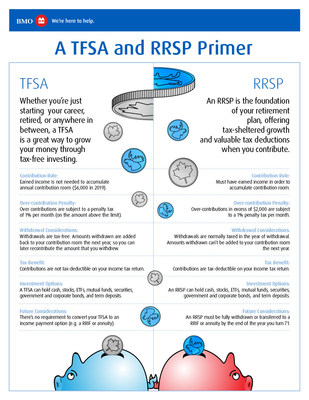News Releases
- Close to a third of Canadians don't know the difference between a TFSA and RRSP
- Over half of Canadians would choose a TFSA over an RRSP – the gap widens to nearly 70 per cent for those over 55
TORONTO, Feb. 21, 2019 /CNW/ - With the Registered Retirement Savings Plan (RRSP) deadline of March 1 approaching, Canadians are left deciding between whether to allocate money to their Tax Free Savings Account (TFSA) or RRSP. According to BMO's TFSA vs. RRSP report, there is one clear winner: TFSAs, with over half of Canadians indicating they would pick the investment vehicle. The challenge is that nearly a third do not know the difference.

The report, conducted by Pollara Strategic Insights, also found:
- 76 per cent of Canadians are knowledgeable about RRSPs.
- Similarly, three quarters are knowledgeable about TFSAs.
- Knowing the difference is a different story. Nearly a third (32 per cent) do not know the difference between TFSAs and RRSPs.
An RRSP is a tax-deferred savings vehicle that allows Canadians to help fund their retirement. Contributions are tax deductible, which means the individual's taxable income is reduced by the amount contributed in a given tax year. A TFSA is a flexible, registered general-purpose savings vehicle that allows Canadians to earn tax-free investment income to meet lifetime savings needs more easily.
"It's encouraging to see Canadians investing for longer term goals – buying a house or retirement – and putting more money into investments to get there," said Mathieu Lepine, Head, Term Investments, BMO Bank of Montreal. "What will be important going forward for Canadian investors is seeking financial advice so that they don't succumb to any of the downsides of either the TFSA or RRSP. Getting hit with tax penalties or being penalized for over contributing can start to eat away at the amount invested."
TFSA Keeps its Crown
The report also looked at which investment vehicles Canadians prefer and found:
- Baby Boomers lead the charge on TFSAs: Since 2014, the gap between Canadians choosing a TFSA over an RRSP has risen to over 20 per cent. 69 per cent of those 55 and over would choose a TFSA over RRSP.
- Demographic nuances: Millennials are the least likely to have an RRSP account, with 56 per cent claiming to not have one. By comparison, two thirds of Generation X and Baby Boomers have an RRSP (67 per cent for each).
Mr. Lepine noted that Baby Boomers have been consistently good, long-term savers, which could point to why they're turning to TFSAs. For Baby Boomers that have built up their RRSPs, the TFSA can be used to enhance their lifestyle and dipped into for discretionary purchases like travel.
"It's a positive indicator to see Canadians flocking to TFSAs – the savings vehicle provides a good amount of flexibility. Leveraging both accounts simultaneously can provide even greater value over the long term. As Millennials start earning more and turn their minds towards retirement, RRSPs will nicely supplement what is being built up in the TFSA," added Mr. Lepine.
TFSA and RRSP Primer:
|
TFSA |
RRSP |
|
- With a TFSA, you do not need to have any |
- With an RRSP, you must have earned |
|
- Over-contributing to a TFSA means you're |
- With an RRSP, you can over contribute |
|
- Withdrawals from a TFSA are tax-free. Any |
- Withdrawals from an RRSP are taxed in |
|
- Contributions to a TFSA are not tax- |
- Contributions to your RRSP are tax- |
|
- Investments held in a TFSA include cash, |
- Investments held in an RRSP include cash, |
|
- There is no requirement to convert the |
- An RRSP must be fully withdrawn or be |
For more information on BMO TFSAs or RRSPs visit, https://www.bmo.com/main/personal/investments/.
The BMO Survey was conducted by Pollara Strategic Insights via an online survey between November 30 and December 5, 2018, with an online sample of 1,518 adult Canadians. Data has been weighted using the latest census information to be representative in terms of age, gender and region. The margin of error for a probability sample size of 1,518 is ± 2.5% 19 times out of 20.
About BMO Financial Group
Serving customers for 200 years and counting, BMO is a highly diversified financial services provider - the 8th largest bank, by assets, in North America. With total assets of $774 billion as of October 31, 2018, and a team of diverse and highly engaged employees, BMO provides a broad range of personal and commercial banking, wealth management and investment banking products and services to more than 12 million customers and conducts business through three operating groups: Personal and Commercial Banking, BMO Wealth Management and BMO Capital Markets.
SOURCE BMO Financial Group

